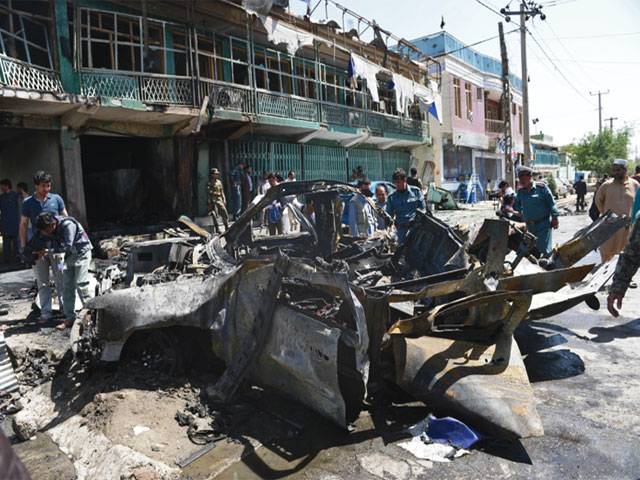KABUL - A suicide bomber in a car attacked a convoy of foreign troops in Kabul on Thursday, killing at least 15 people including six Americans, Afghan and foreign officials said, in one of the worst attacks in the Afghan capital in months.
Forty people were wounded in the blast during the morning rush-hour.
One Nato sports utility vehicle was completely destroyed in the blast and surrounding streets were quickly cordoned off as US troops arrived at the scene. Schoolgirls fled the area in tears as the clean-up operation began.
The Hezb-e-Islami insurgent group, which is allied with the Taliban, claimed responsibility for the attack on the two-vehicle convoy.
NATO’s International Security Assistance Force (ISAF) said the bomber killed two of its members and four civilian contractors. It declined to give their nationalities. But two senior officials, one Afghan and the other from ISAF, said the two ISAF soldiers and four contractors were all American.
Afghan officials said nine Afghan civilians were killed, including two children. “Some of the dead civilians were badly burnt and cannot be recognised,” Kaneshka Baktash, a spokesman for the Health Ministry, told Reuters. Two children aged six and 10 were among the dead. “Some of the bodies are badly damaged and can’t be identified,” hospital sources said.
Helicopters buzzed over Kabul’s diplomatic area after the attack and sirens whined. President Hamid Karzai strongly condemned the ‘cowardly’ attack. “Terrorists and enemies of Afghanistan’s peace brutally targeted a residential area,” Karzai said in a statement.
Concern about Afghanistan’s prospects is growing as most foreign combat troops prepare to leave by the end of next year.
Karzai has accused neighbouring Pakistan of meddling to destabilise his country. Analysts say Pakistan is manoeuvring to limit the influence of its old rival, India, in Afghanistan.
Pakistan denies meddling and says it wants a peaceful and stable Afghanistan.
The blast caused heavy damage to buildings in the vicinity, including 10 residences. “We were in our home drinking tea when we heard a blast and our windows shattered, the glass wounded all of us,” Zohra, a wounded girl who only gave her first name, said from a hospital bed. Her head was wrapped in a bandage.
“I was at home when I heard a terrible explosion and our whole building shook,” Mustafa, a witness, told AFP.
“All our windows are shattered. I rushed outside to bring my little brothers and sisters from school. I saw five or six people covered in blood who were being taken away in police vehicles.”
“Terrorists detonated an explosives-packed (Toyota) Corolla car near a convoy of foreign forces,” Hashmat Stanikzai, the Kabul police spokesman, told AFP.
A Hezb-e-Islami spokesman told Reuters US military advisers were the targets. “We planned this attack for over a week,” the spokesman, Haroon Zarghoun, said by telephone. Last year, in a similar attack, the group killed seven South African and Russian pilots on their way to work in Kabul. Hezb-e-Islami is a radical militant group which shares some of the anti-foreigner, anti-government aims of the Taliban.
But the political wing of the group, founded by warlord and former anti-Soviet fighter Gulbaddin Hekmatyar, has been in exploratory talks with Afghan President Hamid Karzai on a peace deal to end the 12-year war.
The National Directorate of Security, Afghanistan’s intelligence agency, says it thwarts a large number of attacks on the capital on a weekly basis.
The last suicide bomb attack in Kabul was in March, when a man blew himself up at a Defence Ministry gate, killing nine Afghans, during a visit by US Defence Secretary Chuck Hagel.
The blast came weeks after the Taliban launched their annual ‘spring offensive’ on April 27, opening a crucial period as local security forces take the lead in offensives against the insurgents.
Thursday’s bombing was the deadliest attack in Kabul since June 2012 when Taliban militants killed 18 people at a lakeside hotel on the edge of the city. All NATO combat missions will finish in Afghanistan by the end of 2014 and foreign troops have already begun to withdraw from the battlefield as Afghan police and army take over the fight against insurgents.
More than 11 years after the Taliban regime was ousted in 2001, efforts to seek a political settlement ending the violence have so far made little progress, but pressure is growing ahead of the NATO withdrawal.
Tuesday, April 16, 2024
Bomber hits Nato convoy in Kabul

8:54 PM | April 16, 2024
8:53 PM | April 16, 2024
Death anniversary of comedian Babu Baral being observed today
10:12 PM | April 16, 2024
Heavy rains lash UAE and surrounding nations as the death toll in Oman flooding rises to 18
10:11 PM | April 16, 2024
Israel's military chief says that Israel will respond to Iran's weekend missile attack
10:11 PM | April 16, 2024
PM Shehbaz, Saudi FM confer on regional affairs and strengthen bilateral ties
9:25 PM | April 16, 2024
Pakistan invites Saudi Arabia for joint ventures in PIA, airports
9:04 PM | April 16, 2024
Political Reconciliation
April 16, 2024
Pricing Pressures
April 16, 2024
Western Hypocrisy
April 16, 2024
Policing Reforms
April 15, 2024
Storm Safety
April 15, 2024
Democratic harmony
April 16, 2024
Digital dilemma
April 16, 2024
Classroom crisis
April 16, 2024
Bridging gaps
April 16, 2024
Suicide awareness
April 15, 2024
ePaper - Nawaiwaqt
Advertisement
Nawaiwaqt Group | Copyright © 2024





